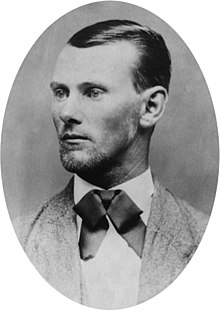Jesse James Northfield Raid
| Jesse James | |
|---|---|

James c. 1882
|
|
| Born |
September 5, 1847 Near Kearney, Missouri, U.S. |
| Died | April 3, 1882 (aged 34) St. Joseph, Missouri, U.S. 39°45′28″N 94°50′39″W / 39.757813°N 94.844087°W |
| Years active | 1866–1882 |
| Spouse(s) | Zerelda Mimms |
| Children | 2, including Jesse |
| Relatives |
Robert S. James (father) Zerelda Cole James (mother) Frank James (brother) Zerelda Mimms (cousin) |
|
|
Jesse Woodson James (September 5, 1847 – April 3, 1882) was an American outlaw, bank and train robber, guerrilla, gang leader, and murderer.
Hailing from the "Little Dixie" area of western Missouri, James was the most famous member of the James-Younger Gang. He and his brother Frank James were Confederate guerrillas or bushwhackers during the Civil War. They were accused of participating in atrocities committed against Union soldiers, including the Centralia Massacre. After the war, as members of various gangs of outlaws, they robbed banks, stagecoaches, and trains.
The James brothers were most active as members of their own gang from about 1866 until 1876, when as a result of their attempted robbery of a bank in Northfield, Minnesota, several members of the gang were captured or killed. They continued in crime for several years, recruiting new members, but were under increasing pressure from law enforcement. On April 3, 1882, James was killed by Robert Ford, a young member of his gang who hoped to collect a reward on James' head. Already a celebrity in life, James became a legendary figure of the Wild West after his death.
Despite popular portrayals of James as an embodiment of Robin Hood, robbing from the rich and giving to the poor, there is no evidence that he and his gang shared any loot from their robberies. Scholars have characterized James as belonging to the regional insurgencies of ex-Confederates following the Civil War, rather than as a manifestation of alleged economic justice or of frontier lawlessness.
...
Wikipedia
